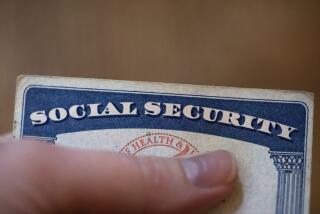Social Security Benefits to Be Increased 4.7% in January
WASHINGTON — The Social Security Administration announced Thursday that benefits will be increased by 4.7% beginning next January to compensate for this year’s inflation.
The increase will be the largest inflation adjustment since the 7.4% boost that took effect in July, 1982. Benefits were last increased in January of this year, by 4%.
The 4.7% increase for 1990 translates to an additional $43 a month, to $966 altogether, for a typical elderly couple if both are eligible for benefits. The increase would be $53, to a total of $1,172, for a typical widowed mother with two children, and $24, to a total of $522, for an aged widow living alone.
“Social Security’s 39 million beneficiaries, including the elderly and disabled reliant upon fixed incomes, can rest assured their buying power will be maintained,” Social Security Commissioner Gwendolyn King said in a statement.
The Social Security Administration announced also that the maximum amount of wages subject to the payroll tax that finances Social Security benefits will rise from the current $48,000 to $50,400 in 1990.
The wage ceiling is adjusted annually. Only about 10.4 million of the 130 million workers subject to the payroll tax had earnings that exceeded the wage base this year, the Social Security Administration said.
Separately, Congress already has legislated an increase in the Social Security tax rate from 7.51% this year to 7.65% in 1990.
The two changes mean that the maximum tax on employees will increase by $250.80 to $3,855.60 in 1990. Employers match their workers’ contributions.
For the self-employed, the tax rate will rise from 13.02% this year to 15.3% in 1990, when half of the taxes can be deducted as a business expense.
Benefits will also rise by 4.7% next year for the 4.5 million recipients of Supplemental Security Income, a federal benefit program for poor people who are aged, blind or disabled.
The boost in Social Security benefits will cost about $11 billion, and the increased SSI benefits will cost about $575 million.
The automatic cost-of-living increases for Social Security, in place since 1975, are tied to a measure of inflation derived from the average consumer price index for urban workers during July, August and September, compared with the equivalent index for the same period in the previous year.
Although cost-of-living adjustments resulted in annual benefit increases of more than 10% in 1980 and 1981, when inflation was running at double-digit rates, Congress actually enacted the adjustments in 1972 as a cost-saving measure.
At the same time, a few months before the 1972 election, Congress granted a 20% benefit increase. President Richard M. Nixon, who opposed such a large increase, nevertheless signed the legislation and took credit for it in a note included in the envelopes containing the first benefit checks with the 20% increase.
More to Read
Get the L.A. Times Politics newsletter
Deeply reported insights into legislation, politics and policy from Sacramento, Washington and beyond. In your inbox three times per week.
You may occasionally receive promotional content from the Los Angeles Times.










